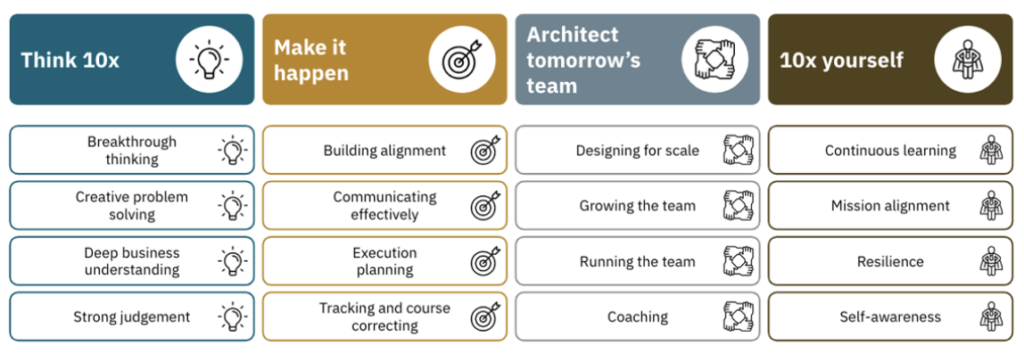Over the past 4 years, our effort has been to develop solutions to every scaling challenge faced by startups. One area that consistently comes up in our conversations with founders is leadership effectiveness. This has been a core area of focus for us at xto10x in the last year. Before sharing our philosophy and approach here, I wanted to share a few patterns we have seen about leaders in startups, and see if these resonate with you.
Do you often feel like all the big ideas come from you?
If your answer is yes, you are not alone! In almost all startups leaders score far lower than their founder(s) in strategic thinking. This can be a limiting factor for growth and causes overdependence on the founder.
Do you feel like execution is often a messy, uphill battle in your startup?
Not surprising, because 1 in 3 leaders are struggling with execution! The three things that most leaders don’t do well here are: prioritization, running regular reviews, and running effective meetings.
Do you see leaders struggling to set up their teams for success?
35% of leaders have not designed their teams in line with strategic priorities. This is the key reason for underperforming teams: they just don’t have the right capabilities needed for the job!
Do you see a mismatch in what you expect of your leaders vs how well they
think they are doing?
60% of leaders overestimate their performance levels significantly! This is a clear sign of expectation mismatch and the need to give objective, input-oriented feedback.
How did we get these insights on leaders in startups? Through our leadership diagnostic tool called “Leadership Quotient”, which will be my focus in this edition of our journal.
Our holistic framework for leadership in startups
We had 50+ conversations with founders and startup leaders to uncover the patterns in terms of inputs that determine leadership success. We combined their observations with insights from our scaling work in areas like business design, execution org design, org manifesto, and culture design through eNPS. This led to our holistic framework for leadership – called the “4 superpowers of a startup leader”

You can read more about the framework here.
We have used our framework above to construct a 360-degree feedback-based leadership measurement metric called Leadership Quotient or LQ. Here’s how it works:

Here’s how startup founders have used the insights from LQ
The LQ diagnostic has been taken by close to 100 leaders from several startups.
Here is how their founders used the results:
- Leadership staffing & org redesign: Some founders used LQ to inform their leadership staffing choices during organization redesigns. Specifically, LQ helped match their leaders’ strengths to the capabilities required of leadership roles in their org.
- Helping your leaders scale: LQ helped one founder develop a personalised coaching plan for his strongest leader. Since every leader who takes LQ is being measured against the same ‘10/10 definition’ of a great leader, LQ benchmarks each leader against peers in the org and across the ecosystem. This gave the founder insight into who to invest in and their areas
of development. - Leadership “input” assessment: While OKRs and business metrics give founders a read on performance, LQ measures “inputs” of leadership. So using LQ in combination with OKRs/metrics helped founders make leadership assessments more well-rounded.
I hope you found our approach to your recurring questions on leadership useful. If you want to use the LQ diagnostic for your leadership team or understand more, please feel free to reply or reach out to our head of learning products, Ramya Segar, by blocking time here.
As always, if you’d like to talk more about any of your other scaling challenges, don’t hesitate to schedule a 1:1 slot on my calendar here.

